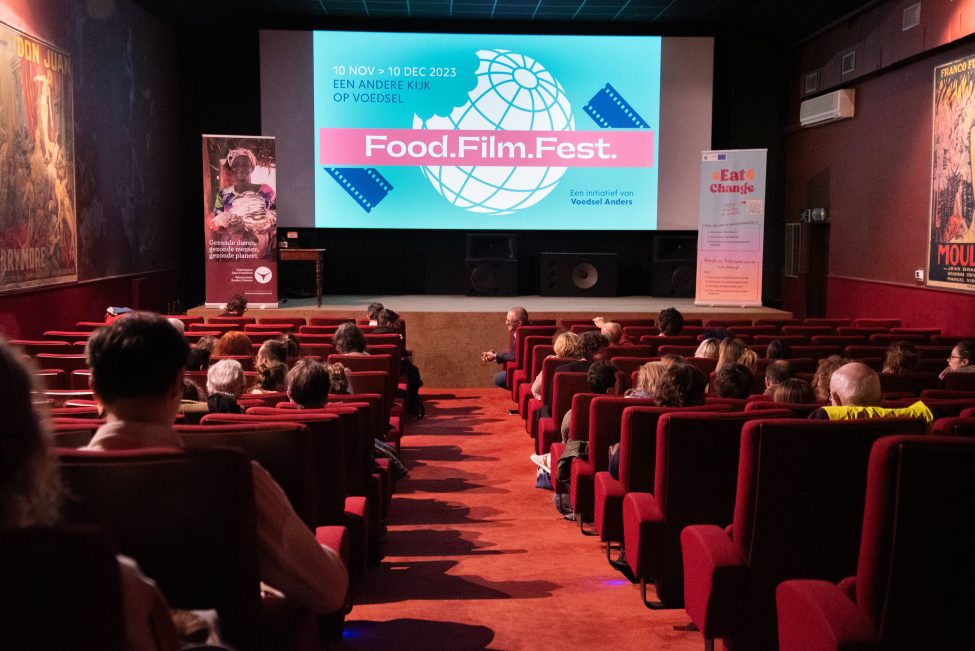With more than 120 film screenings in Flanders and the Netherlands, the Food.Film.Fest. by VoedselAnders was a great success again this year. As a co-curator and member of the core team, we can look back proudly on this third edition of the festival! By means of a refined selection of films about how our food system can be organised differently, we aim to open up the debate surrounding the challenges of complex global food issues and their solutions in an accessible way, with stories that inspire people.
We ourselves organised a screening of the film ‘Sur Le Champ!’ at the Studio Skoop movie theatre in Ghent, in partnership with WWF. The film tells the story of sustainable, resilient, family farms in Belgium, Peru and Burkina Faso. After the film, a debate was held on the opportunities and challenges presented by a transition to an agro-ecological food system. Joost Dessein (Professor of Rural Sociology at Ghent University) engaged in conversation with Bertjan Olivier (manager of Menapii and member of the governing board of the West Flemish Environmental Movement), Pierre-Alexandre Billiet (CEO of Gondola, keynote speaker and author) and Marjolein Visser (Professor of Agro-Ecology at the ULB).
You will find a brief summary of this particularly interesting debate below.
The speakers discussed the opportunities and challenges presented by a transition to an agro-ecological food system.
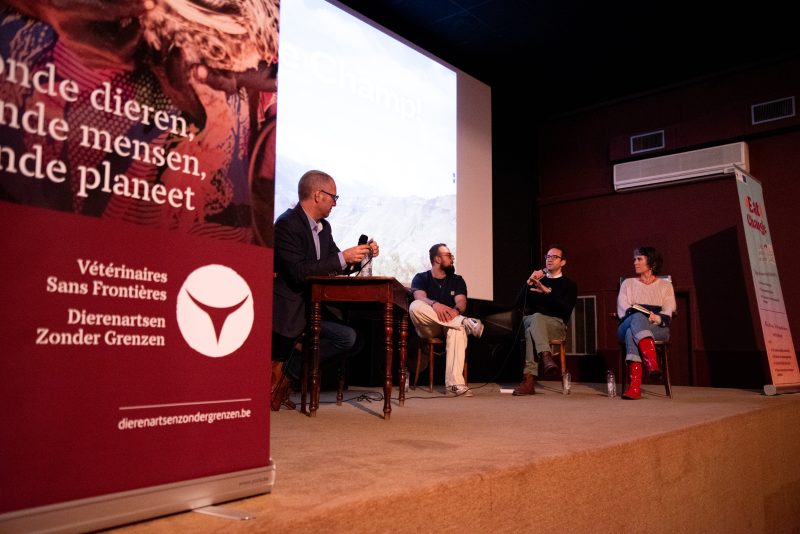 Dessein: One of the aspects emphasised in the film is the role of agents who determine what the farmer gets and what the consumer pays. These intermediaries, who are often retailers in Europe, make a decidedly negative impression. Is retail the bad guy in this story?
Dessein: One of the aspects emphasised in the film is the role of agents who determine what the farmer gets and what the consumer pays. These intermediaries, who are often retailers in Europe, make a decidedly negative impression. Is retail the bad guy in this story?
Billiet: It’s not about goodies and baddies: it’s about the system. Our current economic system of overconsumption only took hold after the Second World War, so it isn’t that old. To keep all the industries going that had emerged during the war – food, cars and munitions – people decided to encourage more consumption rather than reducing production. And I think the huge paradox was that it was a choice back then and it still is. The current system isn’t compulsory: we can free ourselves from it. So if we opt for a new system, retailers will surely follow.
Dessein: So retail is a follower? It’s a particularly powerful industry. Why don’t you have the courage to change certain things yourselves?
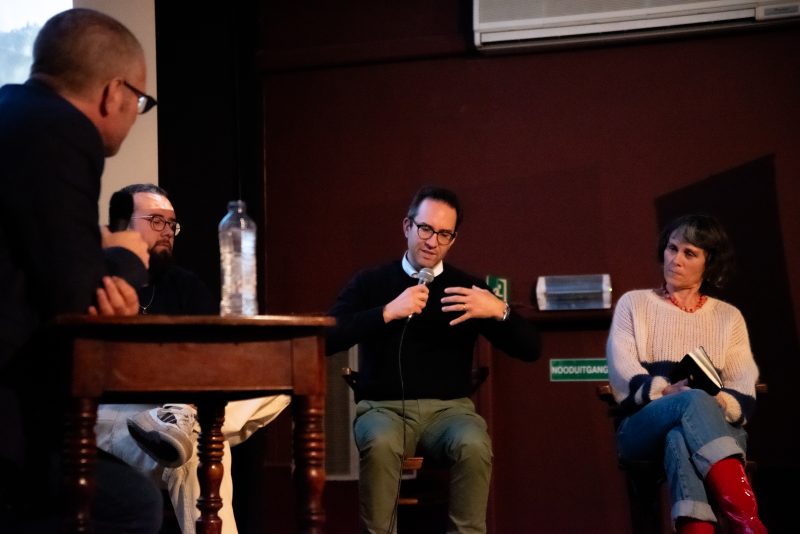 Billiet: Because the question retailers ask is: what is the profitability of transitioning to a new system, and who will follow? How can we create a system out of all the wonderful ideas in the film? If you ask me, we need a collective approach with governments, businesses and consumers sitting around the table together. In my book ‘Consommation de Crise’, I present this as the ‘ABC strategy’ (Administration – Business – Citizen/Consumer). Otherwise, we’ll just keep on pointing the finger at each other. Consumers don’t always buy what is best for their health, and all of us bear the ultimate consequences of that, the external costs of cheap food.
Billiet: Because the question retailers ask is: what is the profitability of transitioning to a new system, and who will follow? How can we create a system out of all the wonderful ideas in the film? If you ask me, we need a collective approach with governments, businesses and consumers sitting around the table together. In my book ‘Consommation de Crise’, I present this as the ‘ABC strategy’ (Administration – Business – Citizen/Consumer). Otherwise, we’ll just keep on pointing the finger at each other. Consumers don’t always buy what is best for their health, and all of us bear the ultimate consequences of that, the external costs of cheap food.
Dessein: Bertjan Olivier, what do you think? Is it up to the consumer?
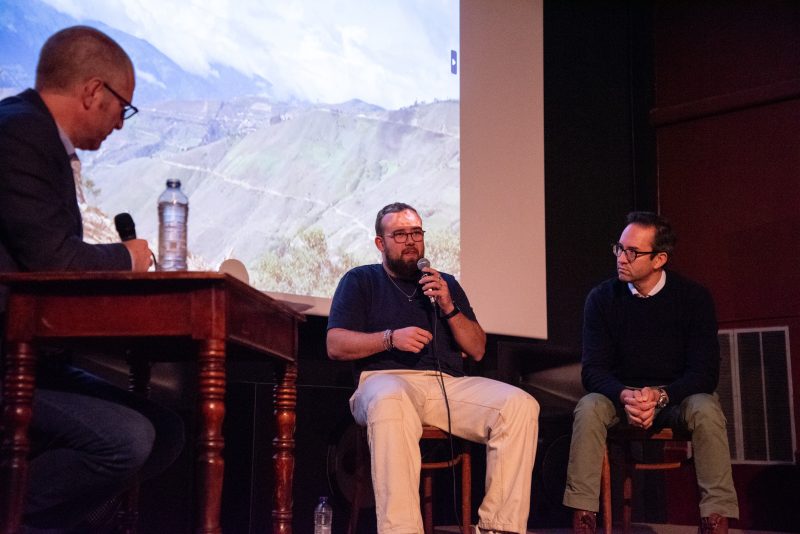 Olivier: The film says that ‘everything you consume is a vote’, but I think consumers bear less responsibility than powerful companies. And I understand that retail follows the consumer. That has a certain logic within the economic model, although I find it despicable. 80 to 90% of sales are still in retail, so they should assume their responsibility. They are the interface between the producer and consumer. So it genuinely is their job to take the lead, tell a story that justifies their choices and create a relationship of trust.
Olivier: The film says that ‘everything you consume is a vote’, but I think consumers bear less responsibility than powerful companies. And I understand that retail follows the consumer. That has a certain logic within the economic model, although I find it despicable. 80 to 90% of sales are still in retail, so they should assume their responsibility. They are the interface between the producer and consumer. So it genuinely is their job to take the lead, tell a story that justifies their choices and create a relationship of trust.
Dessein: And how do you feel about that yourself, as a producer? How do you want the food system to change?
Olivier: At Menapii, we aim to offer an alternative to industrially produced pork. We have backcrossed the old breed of Flemish pig that lived 2000 years ago, in the time of the Menapians, and are putting it back on the market today. In doing so, we are committing to both animal welfare and sustainability. These animals live longer, they are allowed outdoors into the fields, they are only fed scraps, they aren’t castrated, and so on. We have also taken back control of slaughtering, transport, meat cutting and sale. I’m not saying you always have to do everything yourself. You need other stakeholders to build new supply chains with together. In other words, intermediaries don’t always have to be the bad guys.
Dessein: In the film, they talk about agro-ecology as a social movement, but it’s a political movement too. What is the role of policy in bringing about change?
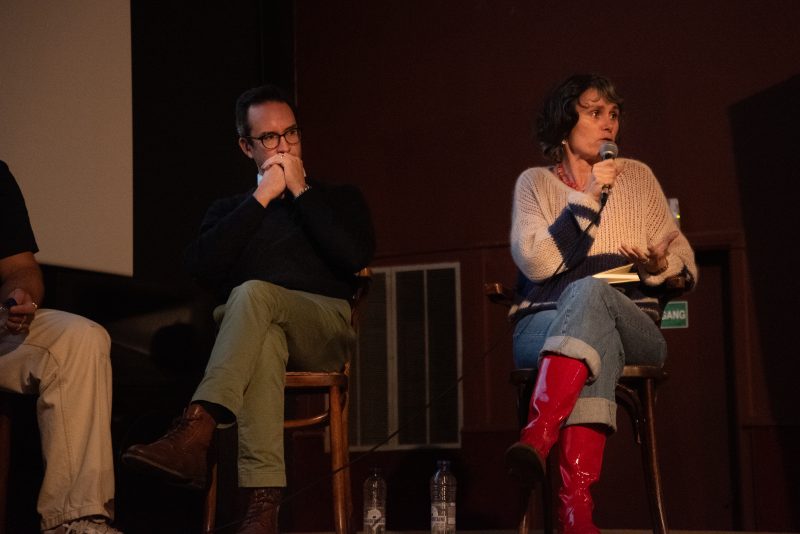 Visser: In theory, policy should serve the common good. But what did we hear today? The European Commission has approved glyphosate for another ten years. Instead of independent policy that represents the public interest, we have a policy that favours the interests of powerful shareholders.
Visser: In theory, policy should serve the common good. But what did we hear today? The European Commission has approved glyphosate for another ten years. Instead of independent policy that represents the public interest, we have a policy that favours the interests of powerful shareholders.
Dessein: What policy do we need today, then?
Visser: As Olivier De Schutter put it so well in the film, we need a European food policy instead of an agricultural policy. A food policy is far more transversal than an agricultural policy. The latter is mainly focused on productivity and growth. At present, the agricultural system is excessively bloated and on the verge of collapse. The average age of a farmer in Flanders is 55, and many have no successor. In contrast, a food policy connects food, health, biodiversity, agriculture and ecosystems. That opens up the debate to many more, different stakeholders, not just farmers. That’s what the difference is.
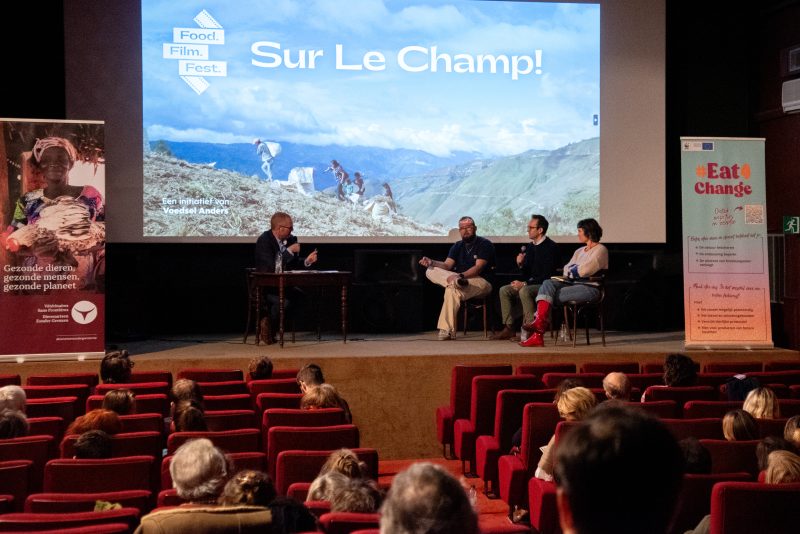 Audience: What role can we play as citizens in bringing about change?
Audience: What role can we play as citizens in bringing about change?
Visser: There are a few very simple things that everyone can do. Firstly, cook your own meals and don’t be tempted by ready meals and fast food. Secondly, be critical about ingredients. Every purchase is a vote, so change the way you shop and avoid the supermarket. Thirdly, and this one is more difficult: plant a vegetable garden. That’s an eye-opener for many people. Three generations ago, almost everyone was still in contact with the soil. Fourthly, make contact with a farmer, any farmer, and try to understand what life is like for them. The fifth and final point, if you really want to go for it, is to become a farmer yourself.

